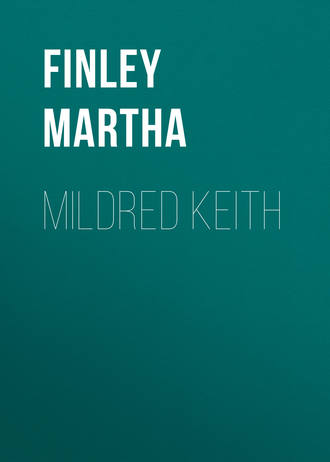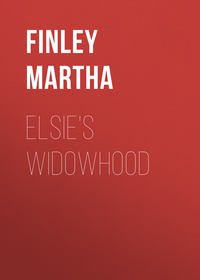 полная версия
полная версияMildred Keith
There were no railroads in that part of the country then, nor for many years after; I think there was no stage route between the two places; there were no steamers on the river; the best they could do was to take a keel-boat.
The rain had ceased and the sun shone brightly on the rippling, dancing waters of the lake and river, on the little town and the green fields and forests of the adjacent country, as they went on board the keel-boat Mary Ann, and set out upon this the last stage of their long journey.
The boatmen toiled at their oars and the Mary Ann moved slowly on against the current, slowly enough to give our travelers abundance of time to take in the beauties of the scenery; which they, the older ones at least, did not fail to do.
Much of it was unbroken forest, but they passed sometimes a solitary clearing with its lonely log cabin, sometimes a little village. The river flowed swiftly along, clear and sparkling, between banks now low, now high, green to the water's edge.
The sun was nearing the western horizon as, at last, the boat was run in close to shore and made fast, with the announcement, "Here we are, strangers; this here's the town of Pleasant Plains."
Chapter Sixth
"Nor need we power or splendor,Wide hall or lordly dome;The good, the true, the tender,These form the wealth of home."– Mrs. Hale.Pleasant Plains considered itself quite a town. It stood high above the river on two plains, the upper familiarly known as the "Bluff." It was laid out in very wide, straight streets, crossing each other at right angles; there were perhaps two hundred dwelling houses, principally frame, but with a goodly proportion of log cabins and a respectable sprinkling of brick buildings.
The county seat, it had its court-house and jail; there were some half dozen stores where almost everything could be had, from dress goods to butter and eggs, and from a plowshare to a fine cambric needle; two taverns, as many blacksmith, shoemaker, and carpenter shops, a flouring mill and a bakery.
Also two churches belonging to different denominations; both frame structures, of extremely plain and unpretentious architecture, with bare walls, uncurtained windows, rough, uncarpeted floors, and rude hard benches in lieu of pews.
No thought of architectural beauty or even of comfort and convenience, beyond that of mere protection from the weather, seemed to have entered the minds of any of the builders here; the houses were mere shells; with no cupboards or closets or the slightest attempt at ornamentation.
Nor was their unsightliness concealed by vines, trees, or shrubbery; almost every one of the beautiful monarchs of the forest once adorning the locality had been ruthlessly felled, and a stump here and there was all that was left to tell of their former existence.
As the keel of the Mary Ann grated on the gravelly shore, a tall figure in rough farmer attire came springing down the bank, calling out in tones of unfeigned joy, "Hello, Keith! Come at last – wife, children, and all; eh? I'm glad to see ye! Never was more delighted in my life."
And the speaker catching Mr. Keith's hand in his shook it with hearty good will, then treating the rest of the party in like manner, as with his and Mr. Keith's assistance, each in turn stepped from the boat.
Mr. George Ward was an old client and friend of Mr. Keith's, who had been long urging this removal.
"I declare I wish I lived in town for a few days now," he went on, "but we're three mile out on the prairie, as you know, Keith. I have my team here, though, and if you like to pile into the wagon, all of you, I'll take you home with me, as it is."
The hospitable invitation was declined with thanks.
"There are quite too many of us, Mr. Ward," Mrs. Keith said, smilingly, "and we want to get into a house of our own just as soon as possible."
"Ah yes, so your husband wrote me; and I've been looking round for you. But the best that's to be had will seem a poor place to you, Mrs. Keith, after what you've left behind in Lansdale."
"I suppose so, but of course we must expect to put up with many inconveniences and probably some hardships even, for the first few years," she answered, cheerfully.
"I'm afraid that's so, but I hope you'll find yourselves paid for it in the long run. Now shall I take you to the Union Hotel? You can't, of course, get into your own house to-night.
"Here, let me carry you, bub," picking up Cyril, "the soil's real sandy here and makes heavy walking."
"If, as I presume from your recommendation of it, it is your best house of entertainment," Mr. Keith said, in reply to the question.
"Yes, sir, there's only one other, and it's a very poor affair," returned Mr. Ward, leading the way.
Mrs. Prior, the landlady, a pleasant-faced, middle-aged woman, with kind, motherly manners, met them at the door with a welcome nearly as hearty as that of their old time friend.
"I'm glad to see you," she said, bustling about to wait upon them, "We've plenty o' room here in town for the right sort o' folks, and glad to get 'em."
She had taken them into her parlor, the only one the house afforded.
The furniture was plain – a rag carpet, green paper blinds, a table with a rod and black cover, windsor chairs, two of them rocking chairs with chintz-covered cushions, the rest straight-backed and hard; on the high wooden mantel shelf an old-fashioned looking-glass, a few shells and two brass candlesticks; these last bright as scouring could make them.
"I'm afraid it must seem but a poor place to you, ladies," she continued, pushing forward a rocking chair for each. "And you're dreadful tired, ain't you? with your long journey. Do sit down and rest yourselves."
"You are very kind, and everything looks very nice indeed," Mrs. Keith answered, looking up at her with a pleased smile as she accepted the offered seat, and began untying her baby's bonnet strings.
"Indeed, I, for one, didn't expect to find half as good accommodations out in these western wilds," remarked Aunt Wealthy, glancing round the room. "I thought you had no floors to your carpets."
"No floors? oh yes; rather rough to be sure; – carpenters here don't make the best of work; and I think sometimes I could a'most plane a board better myself – but to get the carpets is the rub; we mostly make 'em ourselves and the weavin's often done so poor that they don't last no time hardly. Soil's sandy, you see, and it cuts the carpets right out."
"They say this country's hard on women and oxen," put in Mr. Ward, "and I'm afraid it's pretty true."
"Now don't be frightening them first thing, Mr. Ward," laughed the landlady. "Come, take off your things and the children's, ladies, and make yourselves to home. Here, just let me lay 'em in here," she went on, opening an inner door and revealing a bed covered with a patch-work quilt.
"You can have this room if you like, Mrs. Keith; I s'pose you'd prefer a downstairs one with the baby and t'other little ones? There is a trundle bed underneath that'll do for them.
"And the rest of you can take the two rooms right over these. They're all ready and you can go right up to 'em whenever you like. Is there anything more I can do for you now?"
The query was answered in the negative.
"Then I'll just excuse myself," she said; "for I must go and see to the supper; can't trust girls here."
She passed out through another door, leaving it ajar.
"That's the dining-room, I know, Fan, 'cause I see two big tables set," whispered Cyril peeping in, "and there's not a bit of carpet on the floor. Guess they're cleanin' house."
"Well, wife, I'll have to leave you for a little, I must see to the landing of our goods," said Mr. Keith, taking his hat. "Will you go along, Ward?"
"And let us go up and look at our rooms, girls," said Mildred to her sisters. "Mayn't we, mother?"
"Yes, go and make yourselves neat for the supper table."
They came back reporting bare floors everywhere, of boards none too well planed either, but everything scrupulously clean.
"Then we may well be content," said their mother. The gentlemen returned and the guests were presently summoned, by the ringing of a bell on top of the house, to the supper table, which they found furnished with abundance of good, wholesome well-cooked food.
And they were really able to make a very comfortable meal, despite the presence of deli ware, two-pronged steel forks, and the absence of napkins.
"What about the goods, Stuart?" asked Mrs. Keith on their return to the parlor.
"I have had them carted directly to the house; that is, I believe the men are at it now."
"The house?"
"The one Ward spoke of. I have taken it. It was Hobson's choice, my dear, or you should have seen it first."
"Can I see it now?"
"Why, yes, if you choose; it won't be dark yet for an hour. If you and Aunt Wealthy will put on your bonnets, I'll take you round."
"Ada and me, too, father?" cried Zillah eagerly.
"And Fan and Don and me?" chorused Cyril.
"You couldn't think of going without your eldest son;" said Rupert, looking about for his hat.
Mrs. Keith turned an inquiring eye upon her husband.
"Is it far?"
"No; even Fan can easily walk it. Let them come. You, too, Mildred," taking the babe from her arms. "I'll carry baby."
"We'll make quite a procession," laughed the young girl. "Won't the people stare?"
"What if they do? who of us cares?"
"Not I!" cried Rupert, stepping back from the doorway with a commanding wave of the hand, "Procession will please move forward Mr. Keith and wife taking the lead, Miss Stanhope and Miss Keith next in order, Zilly and Ada following close upon their heels, the three inseparables after them, while Marshal Rupert brings up the rear to see that all are in line."
Everybody laughed at this sally while they promptly fell into line as directed, passed out upon the sidewalk and pursued their way through the quiet streets.
People did stare to be sure, from open doors and windows, some asking, "Who are they?" others answering "New comers and they've got a big family to support."
Some remarked that they were nice looking people; while others shook their heads wisely, or dubiously, and said they "expected they were real stuck up folks; – dressed so dreadful fine."
However, the subjects of these charitable comments did not overhear, and therefore were not disturbed by them.
"Do you see that yellow frame yonder, wife?" Mr. Keith asked as they turned a corner.
"With the gable-end to the street and two doors in it, one above and one below?"
"The same."
"It looks like a warehouse."
"That's what it was originally intended for; but finding it not available for that purpose, the owner offered it for rent."
"And is it the one you have rented?"
"Yes; a poor place to take you to, my dear but, as I told you, it was Hobson's choice."
"Then we'll make the best of it and be thankful."
"What a horrid old thing!" remarked Mildred in an undertone, heard only by Aunt Wealthy.
"We'll hope to find the inside an improvement on the out," was the cheerful rejoinder.
"It has need to be, I should say!" cried the girl as they drew near. "Just see! it fronts on two streets and there's not a bit of a space separating it from either; doors open right out on to a sand bank."
"That's what was made by digging the cellar," said Rupert.
"There's a big yard at the side and behind," said Zillah.
"Something green in it, too," added Ada, whose sight was imperfect.
"Nothing but a crop of ugly weeds," said Mildred, ready to cry as memory brought vividly before her the home they had left with its large garden carpeted with green grass, adorned with shrubbery and filled with the bloom of summer flowers.
The June roses must be out now and the woodbine – the air sweet with their delicious perfume – and they who had planted and tended them, so far away in this desolate looking spot.
"Not a tree, a shrub, a flower or a blade of grass!" she went on, sighing as she spoke.
"Never mind, we'll have lots of them next year, if I plant every one myself," said Rupert.
The last load of their household goods had just been brought up from the river, the men were carrying in the heavy boxes and setting them down upon the floor of the front room. The door stood wide open and they all walked in.
"Not a bit of a hall!" exclaimed Mildred, "not a cupboard or closet; nothing but four bare walls and two windows each side of the front door."
"Yes, the floor and ceilings," corrected Rupert.
"And another door on the other side," said Ada, running and opening it.
"Not a mantelpiece to set anything on, nor any chimney at all! How on earth are we going to keep warm in the winter time?" Mildred went on, ignoring the remarks of her younger brother and sister.
"With a stove, Miss; pipes run up through the floor into the room above; there's a flue there," said one of the men, wiping the perspiration from his forehead with the sleeve of his checked shirt.
Mr. Keith stopped to settle with the men for their work, and the others walked on into the next room.
It was as bare and more dreary than the first; somewhat larger, but had only one window, that and an outside door, opening directly upon the side street.
Back of the two rooms and in a line with them, was the kitchen; smaller than either of the other rooms, but provided with a chimney and fireplace; also a small, dark closet under a flight of steep and crooked stairs which led from it to the story above.
This, as they found on climbing up to it, consisted of two rooms, the first extending over kitchen and sitting-room, the other over the front room and of exactly the same size.
The stairs led directly into the first room and it must be passed through to reach the second; therefore had not the recommendation of privacy.
"What a house!" grumbled the children; "how'll we ever live in it? Such a few rooms and not a bit nice."
Mrs. Keith stood in the middle of that large, barn-like upper room, saying never a word, but her heart sinking lower and lower as she glanced from side to side taking in the whole situation.
Aunt Wealthy saw it and came to the rescue. "Never mind, dearie; it will look very different when we have unpacked and arranged your furniture. With the help of curtains several rooms can be made out of this, and we'll do nicely."
"Yes, no doubt we shall, auntie," Mrs. Keith answered with determined cheerfulness. "That front room shall be yours – "
"No, no! you and Stuart must take that – "
"I'm quite set on having my own way in this," interrupted the younger lady in her turn. "It is the best room, and you must take it. Don't hesitate or object, for I should be afraid to have my little ones in there with that outside door opening on to nothing," she concluded, with a laugh.
"Well, wife, what do you think?" asked Mr. Keith, coming up the stairs.
"That we can be very happy here if we make up our minds to be content with our lot."
"That is like you, Marcia; always ready to make the best of everything," he said, with a pleased look.
"I think it's a dreadful place!" exclaimed Mildred, "like a great barn; and so dirty! plaster all over the floor and spattered on the windows too."
"I hope it can be cleaned," her father said, laughing at her rueful face. "Mrs. Prior can probably tell us where to find a woman to do it."
A little more time was spent in discussing plans for the arrangement of the inside of the dwelling; then they stepped into the side-yard and viewed it from the out.
A great dead wall of rough weather boarding broken by one window only and that in the second story, was what met their view as they looked up; down below, first a heap of sand, beyond that a wilderness of weeds and brushwood.
"I'm dumb with despair!" cried Mildred, folding her hands with a tragical air.
"Can dumb folks talk?" asked Cyril.
"As ugly as mud this side," remarked Zillah, turning up her nose scornfully as she scanned the unsightly wall.
"We'll cover it with vines," said Aunt Wealthy.
"And I'll clear the yard and sod it," added Rupert, seizing a great mullein stalk and pulling it up by the roots as he spoke. "Twon't be nearly so hard as the clearing the early pioneers of Ohio had to do, our grandfathers among the rest."
"That's the right way to look at it, my boy," responded Mr. Keith, heartily. "Come now, we'll lock up the house and go back to our hotel for the night."
"There's a log house nearly opposite," remarked Rupert, when they were in the street again, "and the next is a real shabby one-and-a-half-story frame with a blacksmith shop attached. We haven't the worst place in town after all. Ho! look at the sign, 'G. Lightcap;' what a name! 'specially for a blacksmith."
Mrs. Prior joined her guests in the parlor after the younger portion had gone to bed.
"Well, how did you like the house?" she asked.
"I hope we shall be able to make ourselves comfortable there," Mr. Keith answered, in a cheerful tone.
"You can get possession right away, I s'pose."
"Yes; and want to move in as quickly as possible, but must have some cleaning done first."
Mrs. Prior recommended a woman for that without waiting to be asked, and offered to "send round" at once and see if she could be engaged for the next day.
The offer was accepted with thanks and the messenger brought back word that Mrs. Rood would be at the house by six o'clock in the morning.
"But," suggested Aunt Wealthy in dismay, "she'll want hot water, soap, cloths, scrubbing brushes!"
"I'll lend a big iron kettle to heat the water," said the landlady; "a fire can be made in that kitchen fireplace, you know, or out doors, with the brush wood."
"And brushes and soap can be had at the stores, I presume," suggested Mr. Keith.
"Yes; and if they ain't open in time, I'll lend mine for her to start on."
"Thank you very much," said Mrs. Keith. "But, Stuart, we may as well unpack our own; I can tell you just which box to open."
"What a woman you are for doing things systematically, Marcia," he said, admiringly. "Yours is the best plan, I think. Can we be up in season to be on hand there at half-past five, think you?"
"We can try," she answered brightly, "Mrs. Prior, where is your market?"
"We haven't got to that yet, ma'am," replied the landlady, laughing and shaking her head.
"No market? why how do you manage without?"
"There's butcher shops where we can buy fresh meat once or twice a week – beef, veal, mutton, lamb, just whatever they happen to kill – and we put up our own salt pork, hams, dried beef, and so forth, and keep codfish and mackerel on hand.
"Most folks have their own chickens, and the country people bring 'em in too; and butter and eggs and vegetables; though a good many town folks have garden sass of their own raisin'; keep a cow and make their own butter."
"That's the most independent way," remarked Mr. Keith. "I think I must have a cow; if I can get a girl who can milk. Do you know of a good girl wanting a place, Mrs. Prior?"
"I wish I did; but they're dreadful scarce sir; and so sassy! you can't keep 'em unless you let 'em come to the table with the family; and you must be mighty careful what you ask 'em to do."
Chapter Seventh
"I feel my sinews slacken'd with the fright,And a cold sweat thrills down all o'er my limbs,As if I were dissolving into water."– Dryden's Tempest.The Lightcaps were at supper; father and eldest son, each of whom stood six feet in his stockings, with shirt sleeves rolled up above their elbows, displaying brown sinewy arms; the mother in a faded calico, grizzled hair drawn straight back from a dull, careworn face and gathered into a little knot behind in which was stuck a yellow horn comb; years of incessant toil and frequent exposure to sun and wind had not improved a naturally dark, rough skin, and there was no attempt at adornment in her attire, not a collar or a ruffle to cover up the unsightliness of the yellow, wrinkled neck.
Rhoda Jane, the eldest daughter, seated at her father's right hand, was a fac-simile of what the mother had been in her girlhood, with perhaps an added touch of intelligence and a somewhat more bold and forward manner.
There were besides several younger children of both sexes, quite ordinary looking creatures and just now wholly taken up with the business in hand; – vieing with each other in the amount of bread and butter and molasses, fried potatoes and fried pork they could devour in a given space of time.
"Some new comers in town, mother," remarked Mr. Lightcap, helping himself to a second slice of pork. "The keelboat Mary Ann come up the river with a lot of travellers."
"Who, father? somebody that's going to stay?"
"Yes; that lawyer we heerd was comin', you know. What's his name?"
"Keith," said Rhoda Jane, "I heerd Miss Prior tell Damaris Drybread last Sunday after meetin'. And so they've come, hev they?"
"Yes; I had occasion to go up street a bit ago, and saw George Ward takin' 'em to the Union Hotel; the man hisself and two or three wimmin folks and a lot of young uns."
"Damaris was wishing there'd be some children;" remarked Rhoda Jane, "she wants more scholars."
"It don't foller they'd go to her if there was," put in her brother.
"Oh now you just shut up, Goto! you never did take no stock in Damaris."
"No, nor you neither, Rhoda Jane; 'cept once in a while just fur contrariness. No, I don't take no shine to Miss Drybread; she's a unmitigated old maid."
"I wish the man had been a doctor and good on curin' the agur," said Mrs. Lightcap, replenishing her husband's cap. "What's up now, Rhoda Jane?" as that damsel suddenly pushed back her chair, sprang up, and rushed through the adjoining room to the front door.
"A wagon goin' by filled full of great boxes o' goods," shouted back the girl. "There they're stoppin' at the yaller house on the corner. Come and look."
The whole family, dropping knives and forks, the children with hands and mouths full, ran pell mell to door and windows to enjoy the sight.
"I wonder what's up, father? are we goin' to have a new store over there, think?" queried Mrs. Lightcap, standing on the outer step with her hands on her hips, her gaze turned steadily in the direction of the corner house.
"Dunno, mother; b'lieve I'll jest step over and ask. Come along Goto, I guess they'd like some help with them thar big boxes."
They were kind-hearted, neighborly folk – those early settlers of Pleasant Plains, always ready to lend a helping hand wherever it was needed.
"It's the new lawyer feller's traps," announced Mr. Lightcap, as he and his son rejoined the waiting, expectant wife and children; "he's took the house and we'll have 'em for neighbors."
There was another rush to the door, half an hour later, when the Keiths were seen passing on their way to inspect their future abode.
"The prettiest gal I ever see," remarked Gotobed, gazing admiringly after Mildred's graceful, girlish figure.
"They look like eastern folks," said his mother. "Won't they wish they'd staid where they was when they find out how hard 'tis to get help here?"
"Real stuck up folks; dressed to kill," sneered Rhoda Jane. "Look at the white pantalets on them young uns! and the girl's got a veil on her bunnit."
"Well, what's the harm?" asked her brother. "If you had as pretty a skin, I guess you'd be for takin' care of it too."
"Humph! beauty that's only skin deep won't last," and with a toss of the head Miss Lightcap walked into the house in her most dignified style.
For the next ten days the doings at the corner house and the comings and goings of the Keiths were a source of entertainment and intense interest to their neighbors – the Lightcaps and others; a fact not to be wondered at when we consider the monotony of life in the town at that time; – no railroad, no telegraph, no newspaper, except those brought by the weekly mail; no magazines, no public library, and very few books in private houses.
Really the daily small occurrences in their own little world were pretty nearly all the Pleasant Plainers could find to talk or think about.
And the Keiths, as recent arrivals from an older settled part of the country, and above many of them in the social scale, were considered worthy of more than ordinary attention. Their dress, their manners, the furnishing of their house and their style of living were subjects of eager discussion.









